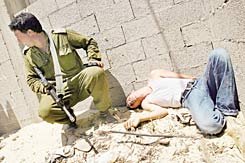

Terrorism and Collective Punishment
I saw youths with murder in their eyes, I saw a paramedic abandon someone wounded

|
We tried to distance the youths and scream to them that he is injured, that they should leave him be. They laughed, pushed, lifted and threw one more rock. Testimony from a murderous summer camp.
The Palestinian youth, Hilal Majaida, is unconscious after the attempted lynch. The paramedic wavered for twenty seconds on whether or not to treat him, and during that time one of the attackers yelled to him: “If you treat him, we’ll kill you”
I had never been a witness to attempted murder – and that is exactly what a gang of children and youth, residents of the outpost “Tal Yam” attempted on Hilal Majaida yesterday.
All of us – media personnel, the army, the police saw these youths as a gang of harmless brats and the word `summer camp` was repeated and heard again and again in reports. The IDF and police hoped the matter would die down on its own. But, these `campers` were murderous. “He’s Arab - we have to kill him,” “Hakam Lehorgeha - The one who comes to kill you” [Translator’s note: This is the beginning of a well-known line from the Talmud (Berahot, 62B) – “Hakam Lehorgeha, Hashkem Lehorgo” - “If someone tries to kill you, rise up and kill him first” meaning a preemptive strike is permissible in defense against a murderer.] – These were the explanations offered by the children involved in the attempted lynch.
The youths, with an average age of 15 maybe less, don’t see a problem with throwing large stones the space of a meter at the head of a young man aged 16, lying unconscious. Four or five stones missed his head.
We were a few journalists who came to his aid and rescue. We tried to distance the youths and scream to them that he is injured, that they should leave him be. They laughed, pushed, lifted and threw one more rock. In the end they struck, with one large stone, the head of the injured man. Only then did we pull ourselves together, and began to drag the injured man from there. The settler youth attacked us from the rear.
Someone alerted a paramedic; I do not know his name, though I do know he is a resident of Gush Katif. He wavered for twenty seconds on whether or not to treat Hilal, and during that time one of the attackers yelled to him: “If you treat him, we’ll kill you.” He turned with an embarrassed look and left. The injured man lay, blood covering his face, losing consciousness. He was brought to the hospital in Khan Yunis.
The indecision of the paramedic on whether or not to treat the injured man is the irresolution of the residents of Gush Katif, opposite a gang of rioters that has taken control of the hotel and the agenda. They do not want to participate in the violent rioting, the breaking of the law of these youths. They want a different image, of moderation, that inspires sympathy.
But the residents of Gush Katif also don’t really want to deal with them, and certainly not to condemn them. “After all, they are coming to help us, even if their way is a bit different,” explain the residents of the Gush. So they turn and leave, but the disgrace clings also to them.
| Related Articles |
68 women gave birth on checkpoints, 34 infants and 4 women died |
Social, Economic and Political Status of Arab Citizens of Israel |
| Organizations |
Mossawa Center: The Advocacy Center for Arab Citizens of Israel |
| Stay Informed |
|
Sign up for our mailing list and receive an email whenever we post a new article on our news site, Israel-Palestine News. |
If Americans Knew distributes and posts to our website copyrighted material, sometimes without the permission of the copyright owner. We are making such material available in our efforts to advance understanding of the Israel/Palestine conflict. We believe this constitutes a ‘fair use’ of any such copyrighted material as provided for in section 107 of the US Copyright Law since it is being distributed without profit for purely educational purposes. For more information go to: http://www.law.cornell.edu/uscode/17/107.shtml. If you wish to use copyrighted material from this site for purposes of your own that go beyond ‘fair use’, you must obtain permission from the copyright owner.
This website is printer-friendly. Please Print this article and share it with your friends and family.

